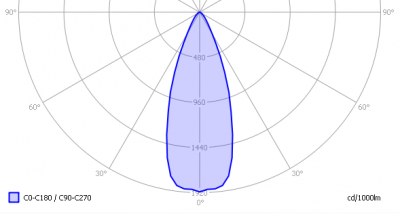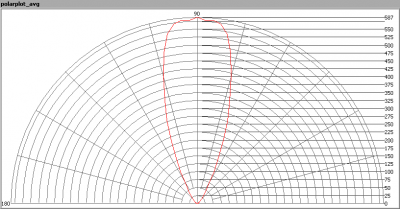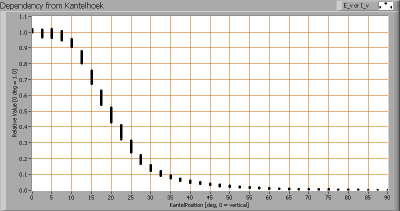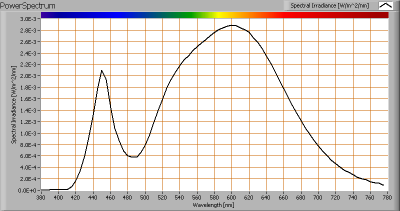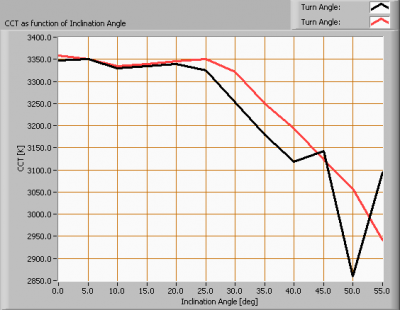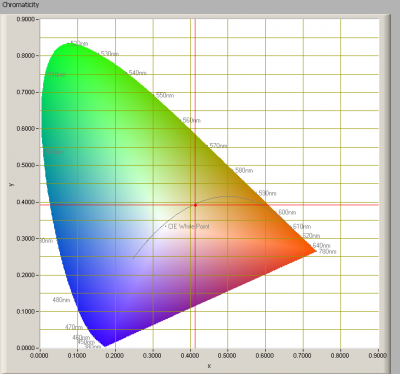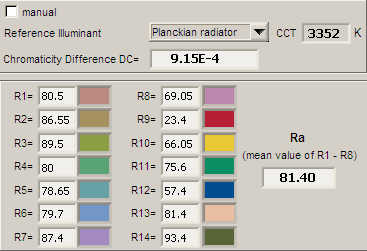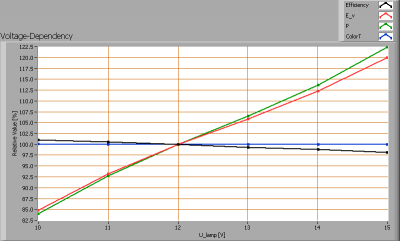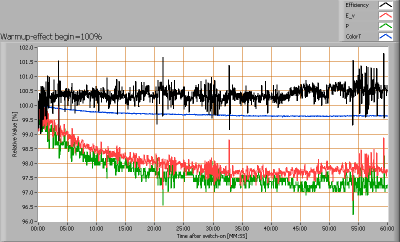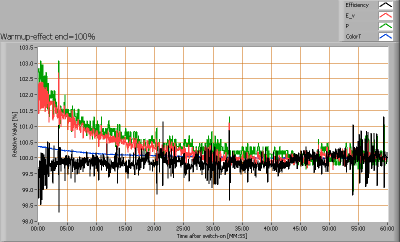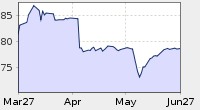LLE AR111 5L 15W 3000K
Posted by Marcel van der Steen in Led lights, Light measurements No Comments» presents a measurement set of a robust led light that has 5 leds of 3 W type, in a robust housing. In this article the measurement data can be found as well as in Eulumdat format.
See this overview for a comparison with other light bulbs.
Summary measurement data
| parameter | meas. result | remark |
|---|---|---|
| Color temperature | 3352 K | Close to warm white |
| Luminous intensity Iv | 586 Cd | |
| Beam angle | 39 deg | A beam about equal to the one of a 230 V 50 W halogen spot light. |
| Power P | 8.5 W | |
| Power Factor | 0.84 | For every 1 kWh net power consumed, there has been 0.64 kVAhr for reactive power. |
| Luminous flux | 307 lm | |
| Luminous efficacy | 36 lm/W | |
| CRI_Ra | 81 | Color Rendering Index. |
| Coordinates chromaticity diagram | x=0.4121 and y=0.3922 | |
| Fitting | 12V | |
| D x H external dimensions | 110 x 58 mm | External dimensions of the spot light, including the clamps to connect to 12 V AC/DC |
| D dimensions luminous area | 74 mm | Dimensions of the luminous area (used in Eulumdat file). This is the area around the leds. |
| General remarks | The ambient temperature during the whole set of measurements was 23.5 deg C.
Warm up effect: all variations in consumer power and illuminance within 3 %, so not a visible effect. Voltage dependency: consumed power and illuminance are dependent from the light bulb voltage; heir dependence is linear. For the eulumdat file follow this link. Herewith a photo of the light bulb mounted in the measurement bench for the measurement of this light bulb. |
|
| Measurement report (PDF) |
Eulumdat light diagram
With this article an eulumdat file is added. This is a file that a.o. indicates the radiation pattern around the light bulb. There are more parameters in the file, and these all can be read with help of the free open source program Qlumedit.
An interesting graph is the light diagram, indicating the intensity in the C0-C180 and the C90-C270 plane.
The light diagram giving the radiation pattern in the C0-C180 and C90-C270 planes.The C0-C180 plane and the C90-C270 planes give the same result, as the spot light has a symmetry over the x-axis.
Illuminance Ev at 1 m distance, or the luminous intensity Iv
Herewith the plot of the averaged luminous intensity Iv as a function of the inclination angle with the light bulb.
The radiation pattern of the light bulb.
This radiation pattern shows a beam that is like the beam of a 50 W 230 V halogen light spot.
These averaged values are used (later) to compute the lumen output.
The intensity measurements (of each turn angle) as function of inclination angle.
This plot shows per inclination angle the intensity measurement results for each turn angle at that inclination angle. There is little variation in light intensities for different turn-angles, looking at the small inclination angles.
When using the average values per inclination angle, the beam angle can be computed, being 39 degrees. However, this value is dependent from the plane observed.
Luminous flux
With the averaged illuminance data at 1 m distance, taken from the graph showing the averaged radiation pattern,it is possible to compute the luminous flux.
The result of this computation for this lamp is a luminous flux of 307 lm.
Luminous efficacy
The luminous flux being 307 lm, and the power of the lightbulb being 8.5 W, yields a luminous efficacy of 36 lm/W.
A power factor of 0.84 means that for every 1 kWh net power consumed, a reactive component of 0.64 kVAr was needed.
| Light bulb voltage | 12.0 V |
| Light bulb current | 838 mA |
| Power P | 8.5 W |
| Apparent power S | 10.1 VA |
| Power factor | 0.84 |
Color temperature and Spectral power distribution
The spectral power distribution of this light bulb.
The measured color temperature is about 3350 K, a little colder than warm white.
This measurement is done straight underneath the light bulb. This color temperature can also be measured when looking at the light bulb under different inclination angles.
The color temperature dependent from the inclination angle.
There are changes in the color temperature when looking at the tube under different inclination angles. These variations are in the order of 10 %.
Chromaticity diagram
The chromaticity space and the position of the lamp’s color coordinates in it.
The light coming from this lamp is on top of the Planckian Locus (the black path in the graph).
Its coordinates are x=0.4121 and y=0.3922.
Color Rendering Index (CRI) or also Ra
Herewith the image showing the CRI as well as how well different colors are represented (rendered). The higher the number, the better the resemblance with the color when a black body radiator would have been used (the sun, or an incandescent lamp).
Each color has an index Rx, and the first 8 indexes (R1 .. R8) are averaged to compute the Ra which is equivalent to the CRI.
CRI of the light of this lightbulb.
The value of 81 is higher than 80 which is considered a minimum value for indoor usage.
Note: the chromaticity difference is 0.0009 indicates the distance to the Planckian Locus. Its value is lower than 0.0054, which means that the calculated CRI result is meaningful.
Voltage dependency
The dependency of a number of lamp parameters on the lamp voltage is determined. For this, the lamp voltage has been varied and its effect on the following lamp parameters measured: illuminance E_v [lx], color temperature CT or correlated color temperature CCT [K], the lamppower P [W] and the luminous efficacy [lm/W].
Lamp voltage dependencies of certain light bulb parameters, where the value at 12 V is taken as 100 %.
The power consumed and the illuminance measurements do depend linearly on the light bulb voltage applied.
To check whether this dependency can lead to visible changes in illuminance for possible grid voltage changes, it is noted what variations occur when the lamp voltage varies around 12 V + and – 0.5 V (or + and – 1 V which is more worst case, but + and – 0.5 V at 12 V corresponds to + and – 5 V change when 230 V is used). Then the illuminance varies with 4 % which will not be remarked.
Warm up effects
After switch on of a cold lamp, the effect of heating up of the lamp is measured on illuminance E_v [lx], color temperature CT or correlated color temperature CCT [K], the lamppower P [W] and the luminous efficacy [lm/W].
Effect of warming up on different light bulb parameters. The 100 % level is put at begin (top) and at the end (bottom).
The variations of consumer power and illuminance stay within 3 % during the 1 hour warm-up period. This is not relevant.
Mounting the light bulb for measurement
Herewith a photo of the support plate used specifically for the specific dimensions of this light bulb, to be able to mount it on the BigMama measurement tool.
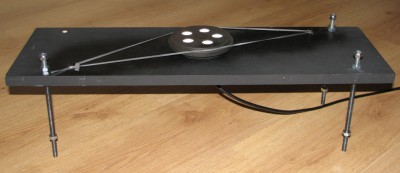
The light bulb mounted on its adapted mount plate.

